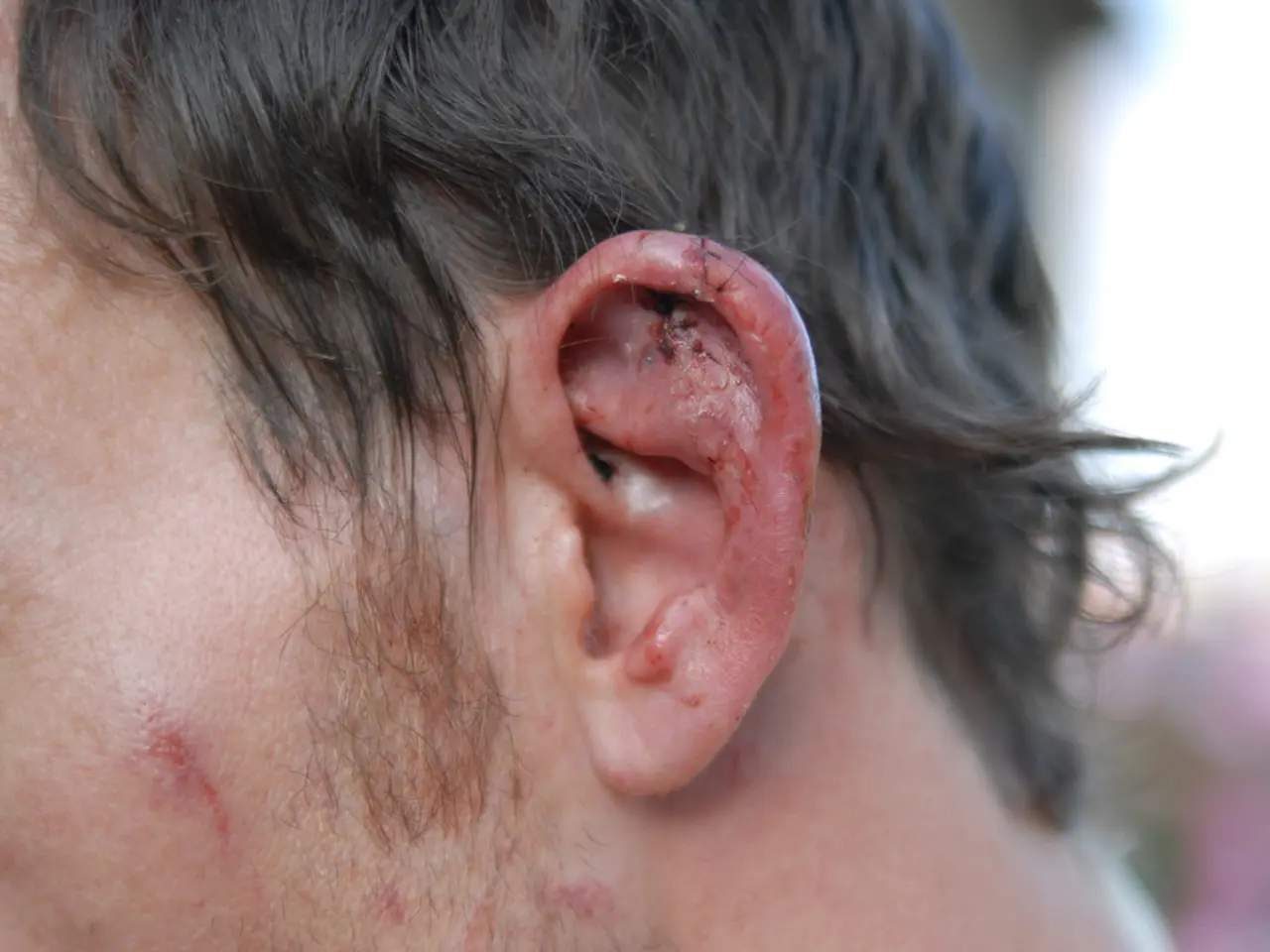Signs, origins, remedies, and prognosis for various conditions
Disseminated Intravascular Coagulation (DIC) is a serious medical condition that affects the body's blood clotting process. This condition can lead to problems with excessive clotting and uncontrolled bleeding.
DIC can be triggered by various underlying conditions, making it crucial to identify and treat the root cause. The most common causes of DIC include severe infections, particularly those caused by gram-negative bacteria, malignancies such as adenocarcinomas of the pancreas, stomach, biliary tract, lung, prostate, breast, and acute promyelocytic leukemia, shock from any cause, severe tissue damage, obstetric complications, complications of surgery, profound intravascular hemolysis, aortic aneurysms and cavernous hemangiomas, and some vascular conditions.
Symptoms of DIC may include bleeding from a wound site, bleeding from the nose, mouth, or gums, bleeding in the rectum or vagina, blood in the stool or urine, small dots or larger patches of bruising, chest pain, and pain, warmth, and swelling in the leg.
In the first stage of DIC, a blood thinner may be used to prevent organ damage. However, in the second stage, a person may need a transfusion of plasma, platelets, or clotting factors due to low levels of these substances in the blood.
Diagnosing DIC can be challenging, as there is no single test to confirm it. However, doctors use a scoring system to help identify it. A thorough medical history, physical examination, and various tests are conducted to make a diagnosis.
Treatment for DIC focuses on controlling clotting or bleeding and addressing the underlying condition. This may involve antibiotics for sepsis, exploratory surgery for internal injuries, early delivery for placental abruption, or other treatments depending on the specific circumstances.
Recovering from DIC can be a lengthy process and may require the care of a team of healthcare professionals from multiple specialisms. Early and prompt treatment increases the chances of a positive outcome for a person with DIC.
Complications from DIC can be severe and include life-threatening bleeding, gangrene, stroke, venous thromboembolism, heart attack, acute kidney failure, medical shock, and multiple-organ dysfunction syndrome (multi-organ failure).
Despite advancements in medical care, the mortality rate for DIC remains high, particularly in cases of sepsis or trauma. However, with proper diagnosis and treatment, the chances of recovery can be significantly improved.
[1] Goldhaber, S. Z. (2017). Disseminated intravascular coagulation. In StatPearls [Internet]. Treasure Island (FL): StatPearls Publishing.
[2] Raghavan, D., & Raghavan, D. (2018). Disseminated intravascular coagulation. In UpToDate. Waltham, MA: UpToDate.
[3] Jaffe, E. S., & Schiff, M. D. (2017). Obstetric complications associated with disseminated intravascular coagulation. In UpToDate. Waltham, MA: UpToDate.
- Understanding blood poisoning (DIC) requires delving into science and the body's blood clotting process.
- Awareness about other blood cell disorders is also crucial in maintaining workplace-wellness and overall health.
- Symptoms of chronic diseases like cancer may not always be apparent, but they can lead to disorders like DIC.
- Respiratory conditions, digestive health, and eye-health are among the many areas affected by various medical conditions.
- Hearing issues, mental health, and men's health are often overlooked in conversations about health and wellness.
- Skin care, fitness and exercise, and sexual health are essential components of a holistic approach to health and wellbeing.
- Autoimmune disorders, such as lupus or rheumatoid arthritis, can cause inflammation in various parts of the body.
- Aging brings unique challenges, such as managing weight and maintaining cardiovascular health.
- Womens-health issues, like menopause or gestational diabetes, require specific attention and care.
- Parenting can be stressful, and addressing mental health concerns is crucial in ensuring the wellbeing of parents and children.
- Nutrition plays a significant role in managing and preventing numerous health-related conditions, including DIC.
- Aging can also bring on neurological disorders like Parkinson's disease or Alzheimer's, which require therapies and treatments for management.
- Skin conditions, such as eczema or psoriasis, can be managed with proper care and medication.
- Medicare can provide access to treatments and procedures for individuals with DIC or other medical conditions.
- In recent years, the compound CBD has gained interest as a possible treatment for a variety of disorders, including neurological and skin conditions.




